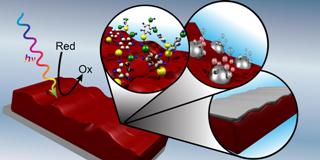Jun 10 2015
Dr. Guijarro and Mathieu Prévot have published a perspective on surface modification of semiconductor photoelectrodes in PCCP.
 © 2015 EPFL
© 2015 EPFL
Photoelectrochemical (PEC) cells have emerged as promising devices that afford the direct conversion of solar energy into electric power and/or chemical fuels. Apart from the obvious importance of the bulk properties of semiconductor materials employed as photoelectrodes, the semiconductor–liquid interface has proven to strongly govern surface-related processes, i.e. the stability, charge separation/recombination and catalytic activity. Because of this, numerous surface treatments have been reported in an effort to tailor the physicochemical properties of the semiconductor–liquid interface, and in turn, the overall PEC response. In this Perspective article we provide a brief conceptual overview of these surface engineering treatments, connecting the particular effects on the interfacial energetics with the respective consequences on the performance. The beneficial effects that arise from surface treatment are categorized as (i) the protection of the surface against photocorrosion, (ii) the passivation of deleterious surface states, (iii) the modification of the band edge positions or band bending, and (iv) the selective extraction of carriers and improved catalytic activity. State-of-the-art surface treatments such as the adsorption of organic molecules or ions, the deposition of semiconductor overlayers and metal nanoparticles or etching procedures are exemplified and described with respect to the observed beneficial effects. A common emerging theme from recent work is that one single surface treatment can lead to multiple distinct effects. Overall, we suggest that surface engineering holds the key for effectively managing the intrinsic common defects of native semiconductor photoelectrodes regardless of their nature, leading to improved light harvesting efficiency.